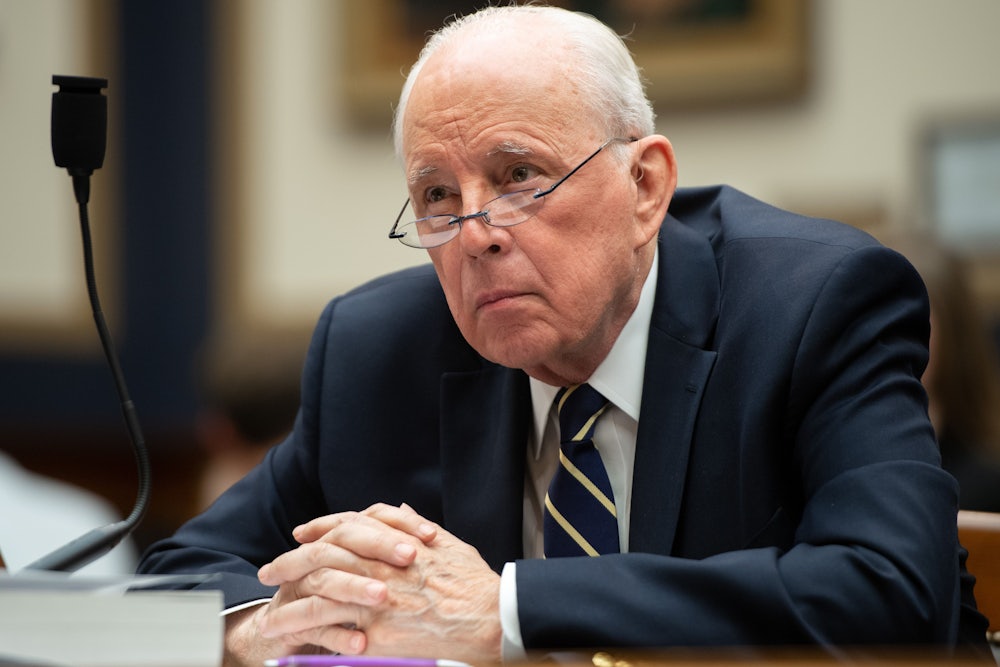It’s easy to imagine what Democrats hoped would happen when John Dean, perhaps the most recognizable witness from the 1973 Watergate hearings, testified before the House Judiciary Committee on Monday. Squeamish about making the case for impeachment themselves, they expected Dean to make it for them. His very presence, after all, recalled the downfall of President Richard Nixon—an event Dean, then the White House counsel, helped bring about. That’s really all he was there to do: Remind everyone that this is Watergate, Part II. Worse than Watergate, even—a phrase that just happens to be the title of Dean’s book about the previous Republican administration.
Republicans in the House saw through this and spent the lead-up to the hearing whining that Dean was not a “fact witness,” and was merely there to garner cable news coverage. They were right this time, though it hardly mattered, given their party’s own addiction to shameless pandering to cameras. (President Donald Trump, it’s worth noting, would spend the following morning live-tweeting Fox News in an attempt to influence coverage.)
The hearing had its moments, of course. Florida Republican Matt Gaetz’s characteristically fumbling and self-defeating attempt to discredit Dean resulted in the hearing’s only truly viral moment:
what a joke pic.twitter.com/Oqn80Djgyi
— jordan (@JordanUhl) June 10, 2019
But mostly, it was a dud. Cable news lost interest quickly, and instead spent the afternoon with cameras trained not at the Capitol, but at a helicopter crash in midtown Manhattan. Democratic Representative Steve Cohen seemed flustered that the media would shrug at the bit of political theater he had helped orchestrate. “It should have been on MSNBC, it should have been on CNN, it should have been on Fox, and not just on C-SPAN 3,” he told MSNBC’s Ari Melber after the hearing.
But C-SPAN 3 is exactly where the hearing belonged. It was the latest bit of quaint pageantry from a Democratic Party talking out of both sides of its mouth. On the one hand, Trump is an existential threat to the body politic, a craven and corrupt swamp creature worse than Nixon. On the other, it’s just not a good time to impeach him.
But Monday’s made-for-public-access circus also points to the Democratic Party’s failure to compete with Trump in cable news’ center ring. Even if they really are serious about not impeaching, they need to get better at turning the screws.
Only House Democratic leadership—which mostly consists of septuagenarian millionaires—could think that Dean’s testimony would move the needle. He had little to offer an Instagrammed-up and Twittered-out America where six in ten were born after Nixon resigned.
Democrats have rightly complained that the public does not adequately understand the findings of the Mueller report. And they are right in believing Attorney General William Barr’s fake summary bent reality in Trump’s favor. Dean, however, has no special inside knowledge about Robert Mueller’s investigations or, for that matter, the current president’s conduct in office. He is, in this context, a talking head—he could offer punditry and a reminder of how we dealt with crooked leaders in the past, but little more. (Two of Dean’s fellow witnesses, former U.S. Attorneys Joyce White Vance and Barbara McQuade, are also cable television regulars.)
Given party leadership’s insistence that the timing is not right for an actual impeachment inquiry, it also made little sense to call Dean to testify at this particular moment. Without the “I-word” attached, the essential all-caps chyron was missing; it’s no wonder that cable news was itching for something else to cover. But the larger failure was the missed opportunity. Dean’s presence was not part of a larger push to explain the president’s inherent criminality; it was a one-off—something akin to the decade-themed primetime specials aired on CNN.
Instead of focusing on spectacle and symbolism—something they can’t seem to pull off, anyway—Democrats need to concentrate on using their hearings to tell a story. They need to build a case, brick-by-brick, against a president who has engaged in a multitude of deliberate, unethical, illegal acts. There needs to be attention to detail; not just the broad gloss that Dean offered. As any teacher of screenwriting will tell you, Democrats need to show that the president broke the law, not just tell us about it.
Showing this, though, will require seriousness, discipline, and more risk than Democrats appear willing to tolerate right now. Having reached an agreement with the Justice Department, HJC members will get more of the underlying information from the Mueller probe than seemed likely only a week ago. On Tuesday, the House also voted to continue to enforce subpoenas on Barr and Trump’s own John Dean, former counsel Don McGahn—though characteristically, the majority delayed a decision on a harsher measure, a contempt vote.
The failure of Dean’s testimony to capture attention is a rebuke of the Democrats’ halting strategy and ham-fisted theatrics. The incremental approach to subpoenas suggests they are not ready to learn their lesson. If Democrats are serious about removing Trump from office—even if it’s just through an election in 2020—they need to start acting like it now.
